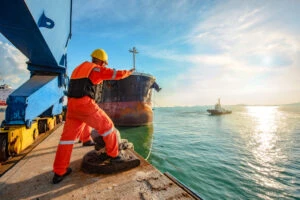
What does the Death on the High Seas Act cover? The Death on the High Seas Act is a maritime law that helps families who have lost a loved one due to negligence. If you have lost a loved one in a maritime accident, you may be eligible to recover compensation.
Our New Orleans Death on the High Seas Act lawyer is well-versed in maritime law. We have years of experience helping families suffering from their loss. While we understand financial compensation will not lessen the grief you feel, we know it may provide some much-needed financial support during this difficult time.
Death on the High Sea Act Basics
There are many types of legislation focused on maritime protection. Among them is the Death on the High Seas Act (DOHSA), which was established to protect the rights of families who have lost a loved one due to negligence. At its base, these protect those who have died in accidents beyond three nautical miles from the United States Coast or workers and passengers on commercial airlines killed beyond a 12–mile distance.
Before the United States government passed and implemented the Death on the High Seas Act, families of those killed beyond the three nautical miles of the United States shore faced significant barriers to claiming compensation. With the DOHSA, families were given some degree of legal recourse, even if only for monetary losses.
Who it Covers
Unlike legislation such as the Jones Act, DOHSA protects the families or estates of those unfairly or negligently killed on the high seas.
Eligible family members include a spouse, parent, or child. This may also cover other relatives dependent on the decedent.
Types of Deaths Covered by the Death on High Seas Act
While DOHSA covers the losses of a victim’s family, there are limitations on the type of incident that would qualify.
For example, it covers families whose loved one was killed on commercial fishing boats, cruise ships, and other water vessels. In more recent amendments to Title 46, this even covers deaths in the seas because of a commercial airline crash.
Injured on Someone Else’s Property?
Know Your RightsOur expert premises liability lawyers will help you hold negligent property owners accountable.
Get a Free Case Evaluation
504-500-1111Causes of Death on High Seas Act Eligible Fatalities
Maritime law is not simple both due to the variety of situations you may find at sea and the ambiguity of jurisdiction and liability. Its nuanced and intricate nature means you need the support of an experienced New Orleans maritime lawyer on your side.
Some of the situations that may result in your eligibility to claim according to the ODHSA include:
- Sunken or capsized boat
- Inadequate staff training
- Fires or explosions
- Inadequate treatment of injuries
While these certainly are not a complete list of examples of negligence, they may provide you with a general understanding of situations that may apply. These can be considered negligence if the established duty of individuals was not met and, therefore, caused the death of your loved one.
If you have any questions about the situation that caused your loved one’s death, you may benefit from speaking with an attorney.
Negligence in a DOHSA Claim
The premise of any personal injury claim is negligence. That is, you must establish that the resulting death or injury is related to someone’s negligent action, lack of appropriate action, or other malicious or negligent intent.
This is done in a few steps:
- Establish a duty of care (the person is responsible for a safe vessel environment)
- Establish a breach of that duty (Leadership failed to adequately train staff in emergency protocol or perform essential safety checks)
- Establish injuries (the death of your loved one and the related costs and financial hardship to your family)
- Establish a link between the negligent actions and the injury or death to show the actions caused the death
Apportioning Liability
In many cases, it may be difficult to establish on your own that your loved one died under negligent conditions. Additionally, it can be challenging to determine who the responsible party or parties are.
The courts will generally apportion the compensation due according to each party‘s percentage of liability, so identifying all possible responsible parties is vital to a successful case.
This liability apportionment includes the decedent. According to section 30304 of the legislation, these types of suits are subject to contributory negligence, which means the amount of compensation due will be decreased by the amount of responsibility the courts assign to the decedent. However, a loved one who contributes to their injuries does not bar the family from collecting compensation.
Harmed by a Dangerous Defective Product?
We’re Here for YouOur experienced product liability attorneys will fight to secure the compensation you deserve for your injuries.
Schedule a Free Consultation
504-500-1111Compensation Available
When we lose a loved one, there is no amount of money to make it okay, but recovering some of what you lost financially due to the accident can help you cope with what happened in the most functional way possible.
The damages available in a maritime injury case can vary significantly based on the specifics of the case. Recovering funds under the different from the Death on the High Seas Act may include:
- Funeral expenses
- Therapy or counseling appointments
- Loss of financial support
While the DOHSA supports those affected by high water tragedies, its compensation does vary from other well-known maritime protections like the Jones Act for Offshore Workers. One example is that families cannot generally collect compensation for pain and suffering, only actual damages. However, you may be able to pursue other avenues if you speak with a Scott Vicknair Injury Lawyer.